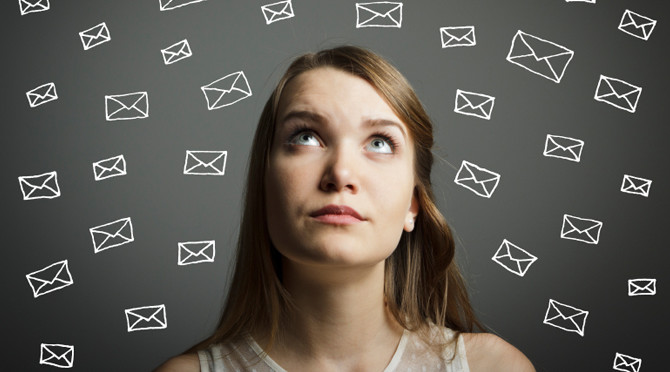Why InkHouse is Pulling Back on Email
Sep 04, 2014 Beth Monaghan
We made a bold move at InkHouse. We're cutting back on email. Yes, that’s right. We’re encouraging our employees not to respond to email messages outside the hours of 7 am and 7 pm (thanks to the smart folks at Edelman for the idea!). We think it will increase our productivity, our creativity and our overall happiness. (Don’t worry clients and press. There are exceptions, and you can still call or text us after hours in case of emergencies!)
I blame email for a lot. Kelly McFalls, one of my colleagues at InkHouse, calls it the “nasty nibbler,” eating away at our days piece by small piece. I, for one, have never had a good idea while staring at my email. I’ve also never felt good about an interaction with a person who’s checking email as he or she sits across from me at dinner (although 38% of us do it), or across my desk at work for that matter.
Although many of us, including myself, have tried to focus our own email chaos, we can’t overcome its pull unless we all agree to a ceasefire. This is no small task. They say it takes 30 days to kick a habit, but I’d suggest that email is more addiction than habit. Gloria Mark at the University of California, Irvine, found that white-collar workers check email 74 times a day! Why?
EMAIL IS ALWAYS THERE. I turned off the audible email notifications on my iPhone a few years ago, along with those for texts and social media updates, but I can’t shake the glaring number in the upper right hand corner of my iPhone’s mail app that tells me exactly how many messages require my immediate attention. I’m like Pavlov’s dogs. I can’t help myself.
BUSYNESS IS A STATUS SYMBOL. In her Washington Post column, “Why being too busy makes us feel so good,” Brigid Schulte reported on the societal shift from a time when we valued leisure to one in which self-worth and identity have become intermingled more with our work. She notes this is part economic – college tuitions have spiked while wages lag creating a chasm of financial need – but it also reflective of a new economy in which jobs are less mechanical and more creative. It’s harder for us to clock out from jobs that require our minds more than our manual labor.
And so we multitask. In fact, Schulte included a 2012 survey on multitasking in her piece that found “38 million Americans shop on their smartphones while sitting on the toilet.” Gross.
I woke up from an email haze (and not my last one) a few years ago when my oldest daughter was 18 months old. She slid down a slide at the park, straight into me while I stood reading email on my phone. I felt silly as she looked up at me, hoping I saw her descent. I hadn’t. That day, I made a decision to become more present – at home and at work.
At work, I placed my laptop to the side of my desk so I would be facing the person sitting across from me, not my computer where the arrival of new messages is hard to resist. I also started turning off my email during important calls. At home, I resolved to put my phone down between 5:30 and 7:30 each evening so I could focus on my family.
Around that time I also realized that doing work and checking email are not synonymous. In fact, my best work was done away from my email – driving to work, walking to lunch, taking a shower.
As Brenda Ueland wrote in her 1938 book If You Want to Write, “…the imagination needs moodling—long, inefficient, happy idling, dawdling and puttering. These people who are always briskly doing something and as busy as waltzing mice, they have little, sharp staccato ideas…..But they have no slow, big ideas.”
I frequently find myself “briskly doing something.” We’ll see how our InkHouse email experiment goes. I’m rooting for it.
Read more:
- New York Times: End the Tyranny of 24/7 Email
- Washington Post: Why being too busy makes us feel so good
- LinkedIn: 6 Tips for Focusing the Email Chaos
- LinkedIn: Making Space for Creativity

.png)




